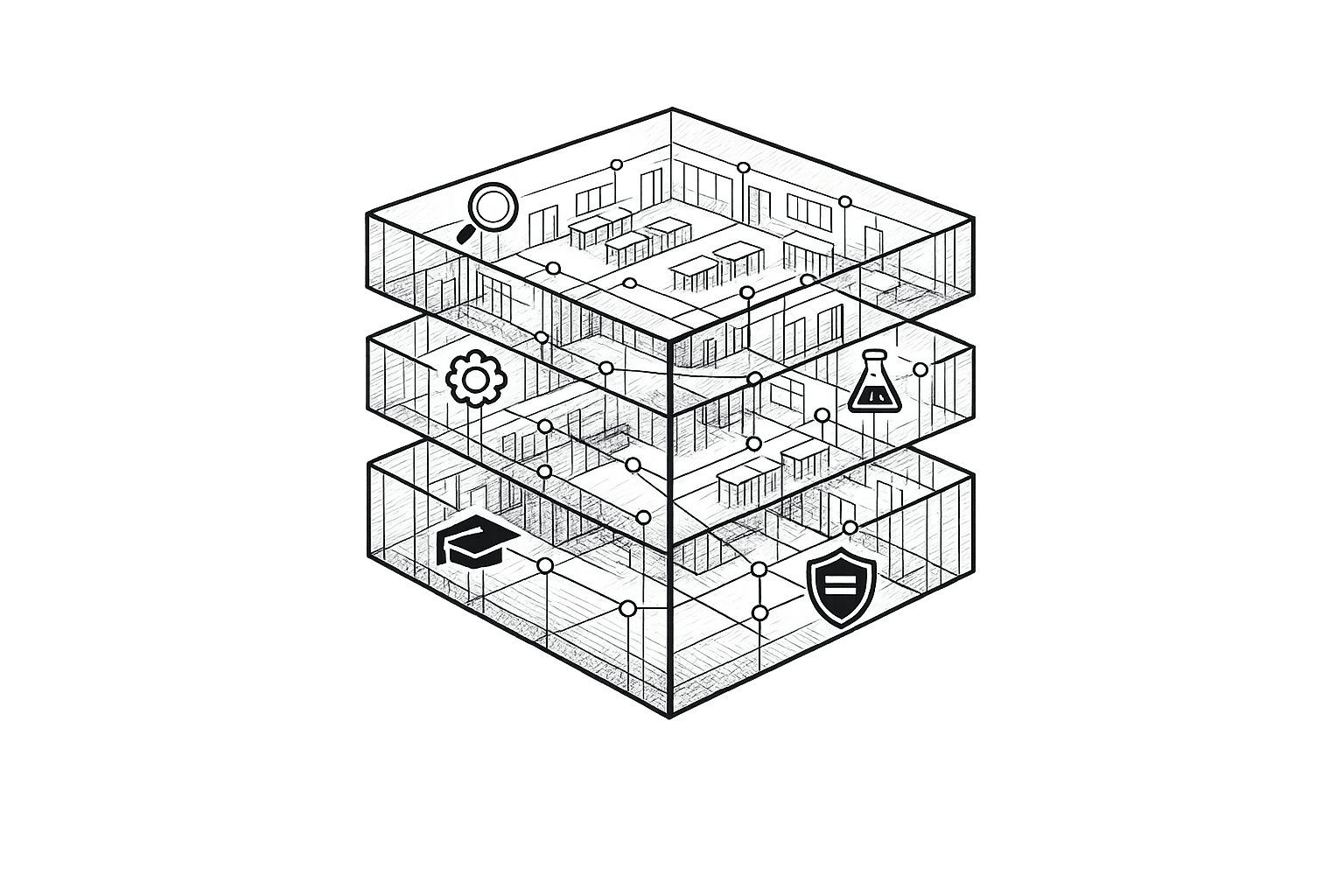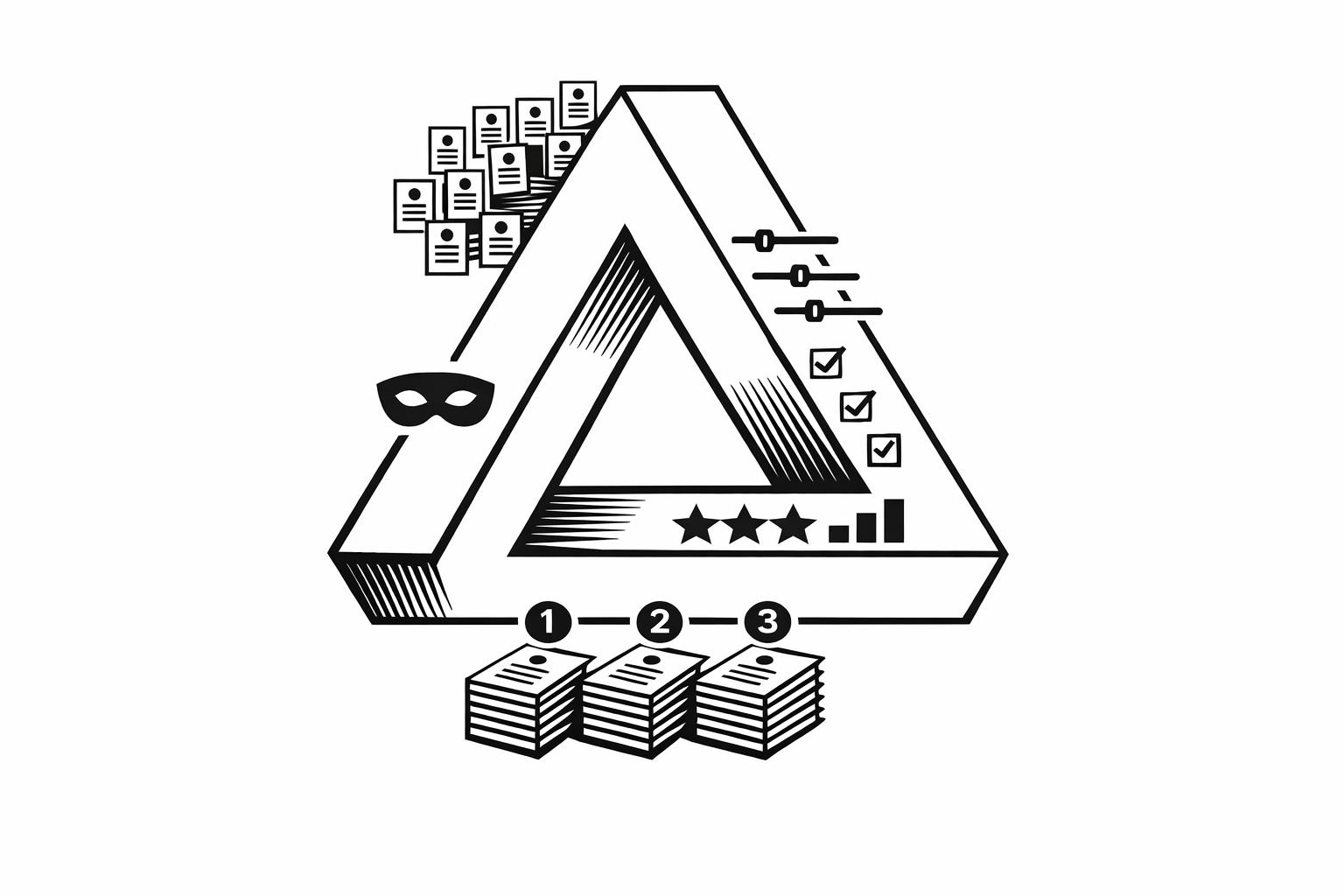What is the Best AI for Your Industry? The Surprising Answer from 500 CEOs"

Looking to choose the best AI tool for your business? Here's what 500 CEOs revealed.
A survey of executives across industries like healthcare, finance, retail, and manufacturing found that success with AI isn't about picking the most advanced technology. Instead, it's about matching the tool to your industry's unique needs. Key findings include:
- Top Priority: Expertise and experience in the vendor matter most.
- High-Quality Data: 75% of CEOs say this is critical for AI success, driving 10-15% higher revenue growth.
- Leading Tools: God of Prompt, ChatGPT, Claude AI, and Midjourney were rated highly for their specific strengths.
Quick Summary of Each Tool:
- God of Prompt: Simplifies AI adoption with 30,000 curated prompts for tools like ChatGPT and Midjourney. Saves time and boosts efficiency.
- ChatGPT: Widely used for tasks like content creation, coding, and customer service. Delivers cost savings and scalability.
- Claude AI: Handles complex tasks like summarization and decision-making with strong safety and compliance features.
- Midjourney: Perfect for industries focused on visual design, offering fast, high-quality image generation.
Key Insight: The right AI tool depends on your specific goals - whether it's improving efficiency, enhancing customer experience, or creating visual content. Start small, focus on high-impact areas, and choose tools that align with your needs.
Best AI Tools for Your Business + ChatGPT Prompts
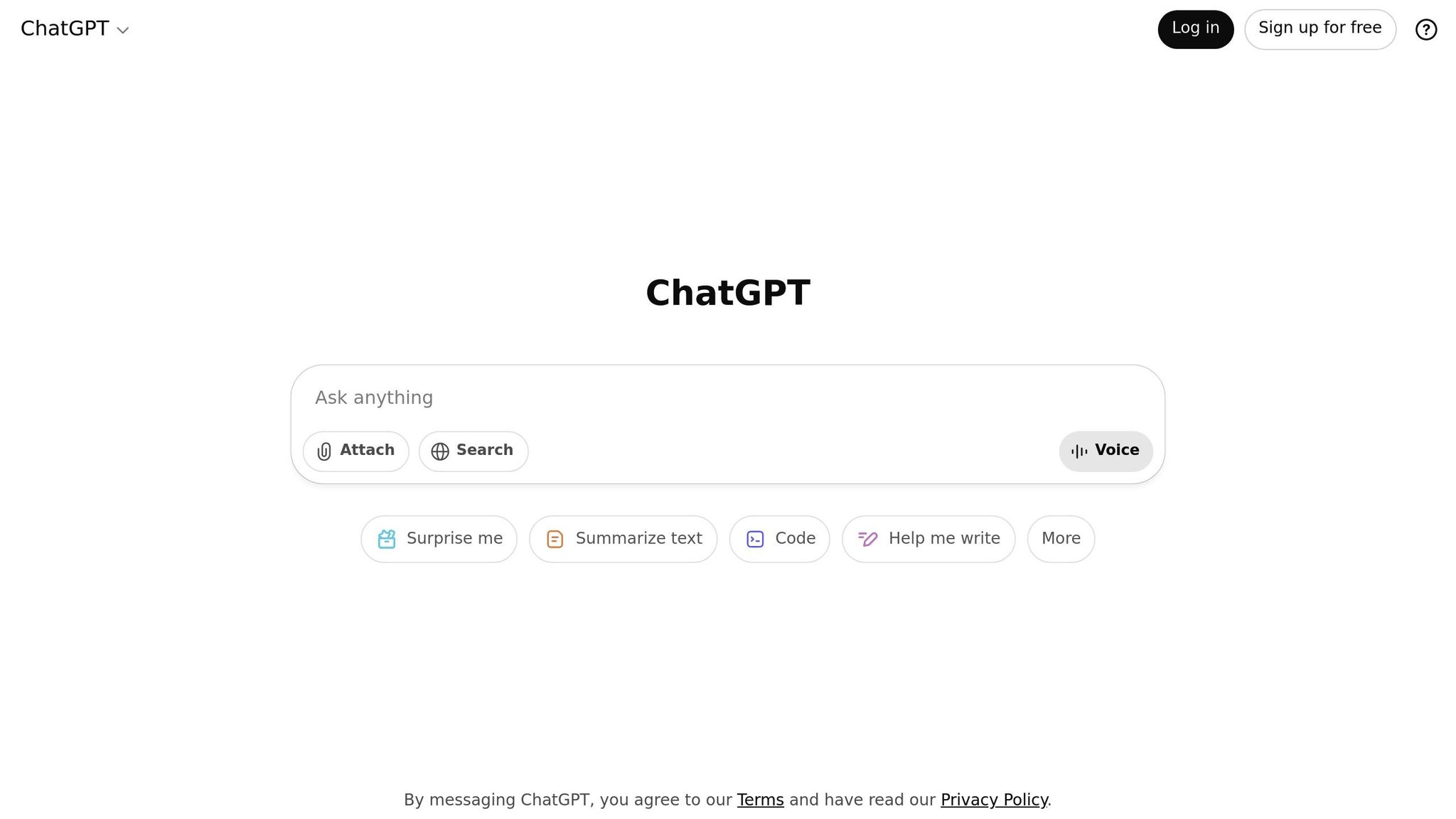
1. God of Prompt
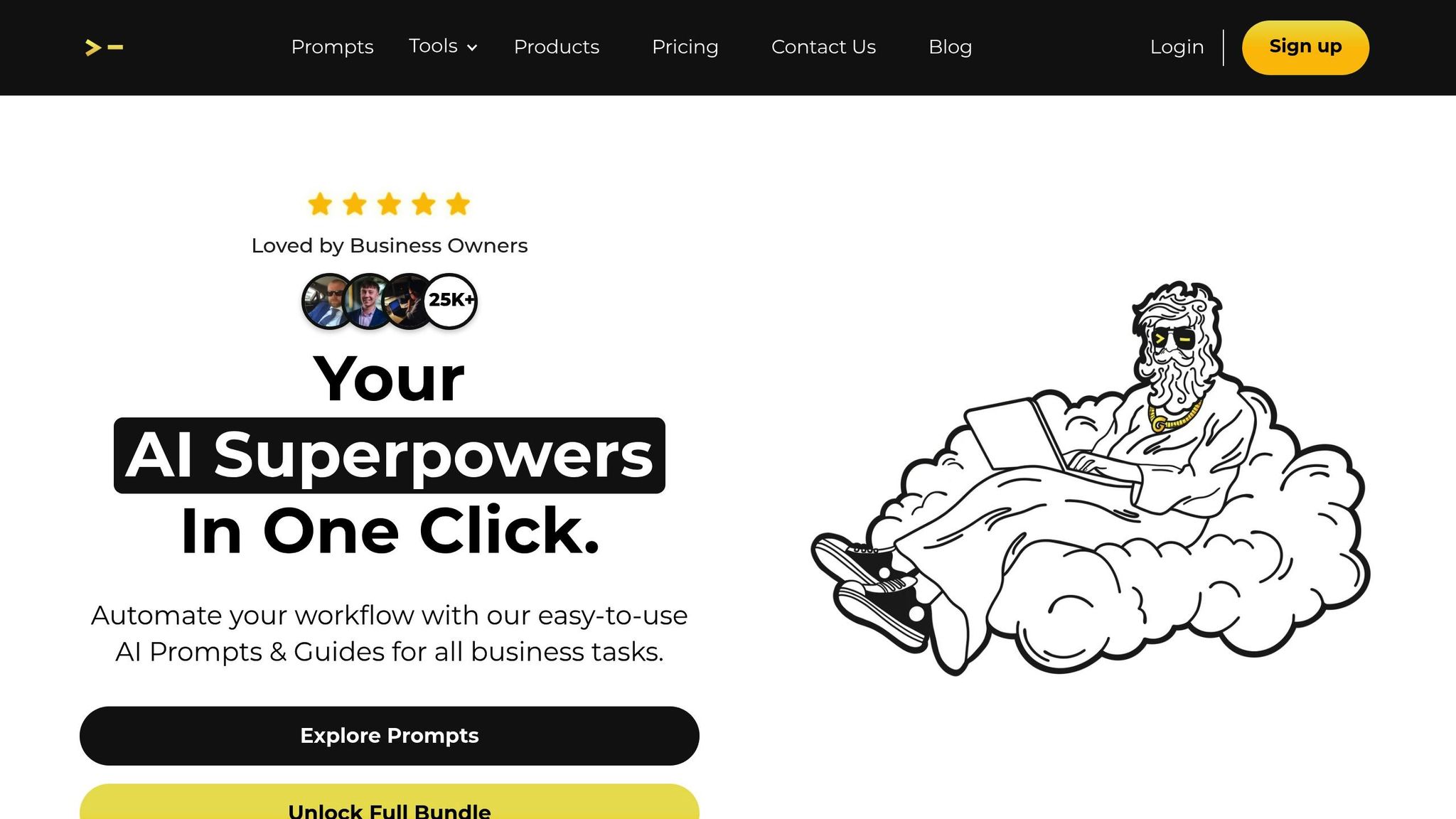
Among the 500 CEOs surveyed, God of Prompt stood out as the top choice for businesses looking to maximize AI's potential without diving into technical complexities. This platform acts as a bridge between sophisticated AI models and real-world business needs, offering more than 30,000 curated AI prompts that work seamlessly with popular tools like ChatGPT, Claude, and Midjourney.
Industry Applications
God of Prompt tackles the challenge of effectively communicating with AI to ensure consistent, high-quality results. Its categorized approach to prompt engineering organizes prompts by specific business functions, making it easy to find what you need. For example, marketing teams can access prompts tailored for content creation, SEO strategies, and campaign planning. Creative agencies benefit from visual prompts designed specifically for Midjourney, while other industries leverage its structured prompts for analytical tasks. This thoughtful organization doesn’t just streamline workflows - it also helps businesses address industry-specific challenges, leading to measurable financial benefits.
ROI and Cost Efficiency
By providing ready-to-use prompts, God of Prompt can save users up to 20 hours per week. Pricing starts at $37 for specialized bundles, with the full package available for $150. This makes the platform a cost-effective solution with a strong return on investment. Plus, a 7-day money-back guarantee minimizes any risk for new users. With a glowing 4.8 out of 5 rating from 743 reviews and over 17,060 satisfied customers, it’s clear that the platform is delivering real value.
Scalability and Integration
God of Prompt isn’t just about immediate savings - it’s built for long-term growth. The platform offers lifetime updates and unlimited access, ensuring users stay ahead as AI models evolve. Updates to prompts are automatically provided at no extra cost, keeping businesses aligned with the latest advancements. Additionally, God of Prompt integrates with multiple AI systems, allowing companies to maintain consistency across tools like ChatGPT, Claude, and Midjourney. This flexibility ensures businesses aren’t locked into a single vendor, creating a seamless experience across different applications.
US Market Relevance
For US businesses, God of Prompt provides an accessible entry point into AI without requiring major investments in technical infrastructure or specialized hiring. It’s particularly well-suited for traditional industries looking to modernize operations. Addressing a common concern among CEOs - the need for immediate productivity gains - the platform allows teams to implement tested prompts right away, without extensive training or hiring AI specialists. This ease of use is especially advantageous for small and medium-sized businesses, leveling the playing field and enabling them to compete with larger enterprises by leveraging advanced AI capabilities.
2. ChatGPT
ChatGPT stands out as the most widely adopted AI tool among surveyed CEOs. Currently, 49% of companies incorporate ChatGPT into their operations, and over 80% of Fortune 500 companies integrated it into their workflows within just nine months of its release.
Industry Applications
ChatGPT’s adaptability shines across various industries. Among its users, 65% of marketing professionals rely on it for content creation, 63% of software developers use it for coding tasks, and 64% of journalists turn to it for summarizing documents.
In February 2023, Carrefour demonstrated a creative use of ChatGPT by pairing it with AI-generated avatars to enhance customer engagement. Elodie Perthuisot, the company’s Chief eCommerce, Digital Transformation, and Data Officer, presented a lifelike avatar powered by ChatGPT scripts to guide customers in choosing healthier and more affordable groceries. Perthuisot noted that Carrefour’s AI initiatives help personalize shopping experiences, simplify product selection, and minimize waste (Source: Emerline, 2025).
Similarly, Ada, a customer service company, partnered with OpenAI to enhance its chatbot capabilities using GPT-3.5. This integration allowed the chatbot to analyze customer inquiries more effectively, provide faster resolutions, and summarize conversations before involving human agents. This approach also offered valuable insights into customer behavior and preferences (Source: Emerline, 2025).
ROI and Cost Savings
The financial advantages of adopting ChatGPT are striking. Around 25% of American businesses reported saving between $50,000 and $70,000, while 11% saved over $100,000 by leveraging GPT technology. Additionally, tools like ChatGPT have boosted customer service productivity by 30–45%, and companies using AI report revenue growth ranging from 3–15%. On the consumer side, 64% of customers are open to purchasing products recommended by AI.
Scalability and Integration
ChatGPT’s ability to scale and integrate seamlessly with business systems like CRM and ERP platforms makes it a valuable tool for organizations. Among surveyed businesses, 93% plan to expand their use of ChatGPT, with 74% utilizing it to manage chatbot responses and 58% focusing on personalized customer interactions. These capabilities make ChatGPT a key resource for navigating complex market demands.
US Market Relevance
In the U.S., ChatGPT addresses critical business priorities such as efficiency and personalization. Seventy percent of business owners report that ChatGPT accelerates content creation, providing a crucial advantage in today’s fast-paced environment. In healthcare, 67% of consumers believe large language models like ChatGPT could offer valuable medical advice, while 97% of business leaders see GPT technology as a positive force in their operations.
"AI, like most transformative technologies, grows gradually, then arrives suddenly."
- Reid Hoffman, cofounder of LinkedIn and Inflection AI, partner at Greylock Partners, and author
3. Claude AI
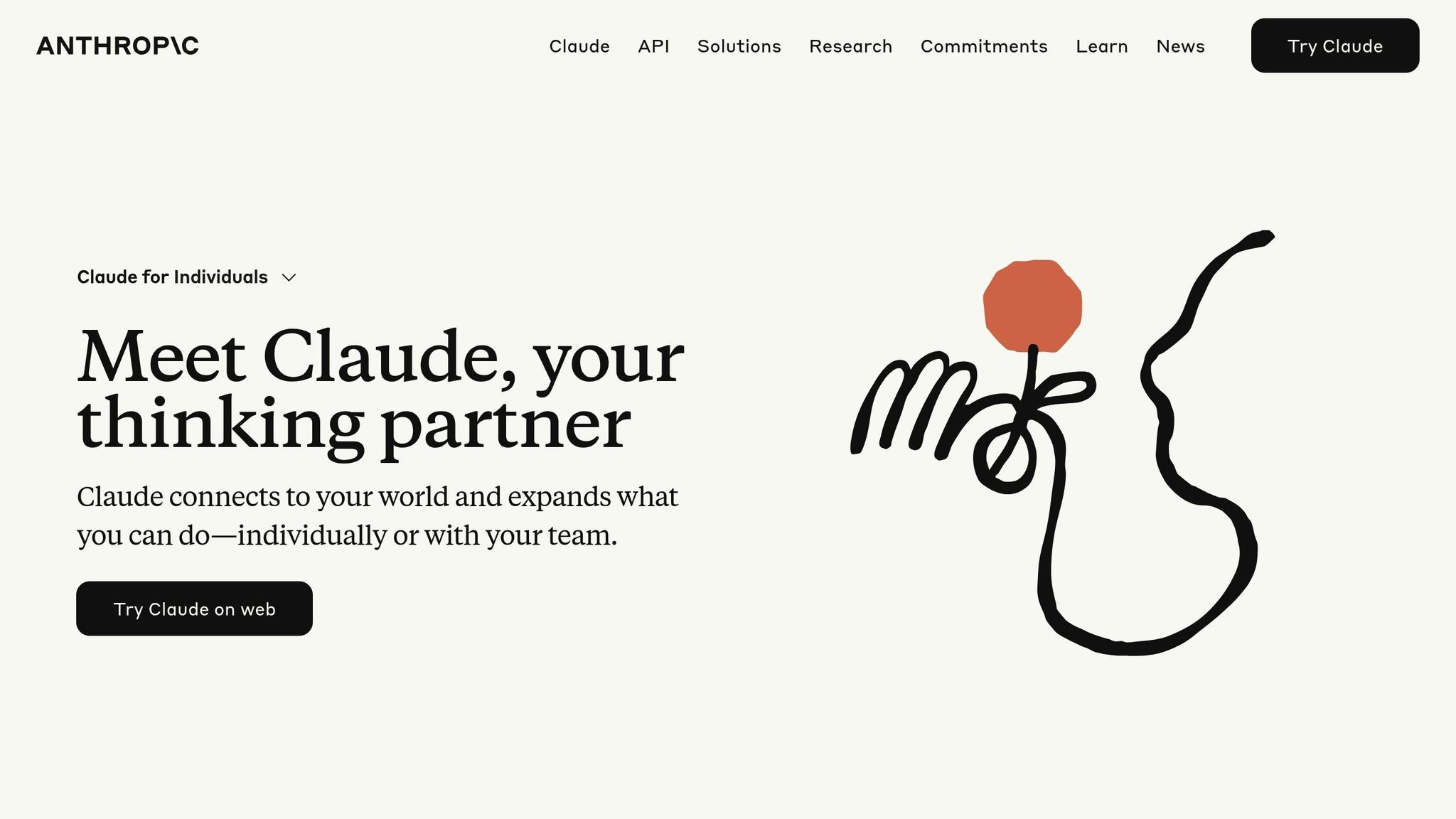
Claude AI is designed to meet the unique demands of various industries, offering intelligent, context-aware responses that simplify complex tasks and enhance business operations.
Industry Applications
Claude AI proves invaluable across industries by managing large-scale content creation, research, and customer support needs. With the ability to process up to 75,000 words in a single session, it ensures accurate and contextually relevant outputs, making it ideal for summarization, editing, Q&A, decision-making, and even coding tasks. This capability is especially beneficial for industries that handle extensive documentation regularly.
In marketing, Claude AI assists with crafting engaging content, tailoring customer communications, and analyzing market trends. In healthcare and education, it supports tasks like processing research papers, managing medical records, and developing educational materials - all while adhering to strict regulatory standards through its Constitutional AI framework.
Customer service teams benefit from its integration into live chat and helpdesk systems, where it provides 24/7 support. Claude AI can interpret complex customer queries, analyze support tickets, and deliver detailed responses with minimal human involvement. These applications not only improve efficiency but also reduce operational costs.
ROI and Cost Effectiveness
For organizations that deal with extensive documentation, Claude AI offers clear cost advantages. For instance, a financial institution processing 50,000 documents monthly saved 19% annually by using Claude 2 ($580,000) instead of GPT-4 ($720,000). Similarly, an e-commerce company managing 100,000 customer inquiries each month reported saving $30,000 annually by switching to Claude Instant ($150,000 per year) from GPT-3.5 Turbo ($180,000).
For individual users, Claude Pro provides a compelling option at $20 per month. This plan includes a 200,000-token context window, which significantly surpasses ChatGPT Plus’s 32,000-token limit at the same price point.
Scalability and Integration
Claude AI is built to scale with the evolving needs of businesses. Its Model Context Protocol (MCP) is a standout feature, enabling seamless integration with external tools and real-time data sources. This open standard allows businesses to add new tools dynamically, without requiring predefined functions, offering unmatched flexibility.
The platform also provides robust API endpoints, allowing developers to embed Claude AI into custom applications, customer-service bots, research tools, and content-generation workflows. For industries that require high levels of trust and data security, Claude AI offers enterprise-grade features like SOC II Type 2 certification and HIPAA compliance.
Notably, GitHub Copilot and Sourcegraph have embraced Claude's MCP, highlighting its value as a coding assistant .
US Market Relevance
Claude AI is tailored to meet the specific needs of US businesses, particularly in areas like compliance, security, and accuracy. Its Constitutional AI framework ensures outputs align with regulatory requirements, making it an excellent choice for sectors such as finance, healthcare, and law. Additionally, its copyright indemnity protections offer peace of mind for companies concerned about intellectual property risks.
With enterprise-grade security and low rates of hallucination, Claude AI appeals to organizations that prioritize data integrity and reliability. Its multilingual capabilities, including fluency in Spanish and Japanese, further support US businesses with global operations, helping them communicate effectively in international markets.
sbb-itb-58f115e
4. Midjourney

When it comes to AI tools tailored for visual creativity, Midjourney stands out. This AI image generator transforms text prompts into visually striking images, making it a go-to choice for businesses that rely heavily on visual content. Whether you're crafting marketing materials, designing websites, or prototyping product concepts, Midjourney offers a unique edge.
Industry Applications
Midjourney shines in industries where design plays a central role. Marketing teams use it to create campaign visuals, web designers rely on it for website graphics, and retail businesses leverage it to prototype new ideas. Its capabilities range from producing hyper-realistic images to generating artistic illustrations.
Take Marshall Atkinson's Halloween-themed t-shirt project as an example. Tasked with creating a design for an amusement park promotion, he used Midjourney to generate 29 detailed design elements, including a spooky town, a witch, floating tarot cards, and magical effects. By assembling these elements in Photoshop, he completed the project in just 2.5 hours - a fraction of the 25–30 hours it would have taken using traditional design methods.
Architecture firms use Midjourney to visualize concepts during the early stages of planning, while entertainment companies rely on it for storyboarding and promotional materials. By focusing on visual storytelling, Midjourney complements other AI tools that excel in data and text-driven tasks.
ROI and Cost Effectiveness
Midjourney's subscription-based pricing model offers flexibility and affordability, making it accessible to businesses of all sizes. Its four pricing tiers cater to varying needs:
| Plan | Monthly Cost | Annual Cost | Fast GPU Hours | Key Features |
|---|---|---|---|---|
| Basic | $10 | $96 ($8/month) | 3.3 hours | 200 image generations, 3 concurrent jobs |
| Standard | $30 | $288 ($24/month) | 15 hours | Unlimited relaxed mode, 3 concurrent jobs |
| Pro | $60 | $576 ($48/month) | 30 hours | Unlimited fast generations, 12 concurrent jobs, Stealth Mode |
| Turbo | $120 | $1,152 ($96/month) | 60 hours | Maximum capacity, priority support |
For as little as $96 annually, small businesses and individual creators can access powerful visual generation tools. Companies that prioritize visual content can see substantial savings compared to hiring freelance designers or maintaining in-house teams. The time saved is equally impactful - projects that once took days or weeks can now be completed in hours.
Scalability and Integration
Midjourney is designed to grow with your business. Its tiered subscription plans cater to everyone, from startups to large enterprises. The API-first design ensures smooth integration into existing workflows, while its Discord-based interface offers real-time collaboration. For those who prefer a more traditional setup, the web interface provides additional functionality without compromising on power.
Job concurrency scales with the subscription level - starting at 3 jobs for Basic and going up to 12 for Pro and Turbo plans. Unlimited relaxed GPU time, available from the Standard plan onwards, adds flexibility for non-urgent projects. Midjourney also fosters a collaborative community where users can exchange ideas, share feedback, and learn advanced techniques.
US Market Relevance
Midjourney's scalability and adaptability align well with the needs of US businesses, especially in competitive visual markets. Its ability to produce culturally diverse and inclusive content makes it a valuable tool for American companies aiming to connect with multicultural audiences or expand internationally.
The subscription model, with clear monthly and annual billing options, fits seamlessly into corporate budgeting practices. Businesses opting for annual plans benefit from a 20% discount, making long-term use even more appealing.
For companies focused on intellectual property, Midjourney's Stealth Mode (available on Pro and Turbo plans) ensures that generated images remain private and secure. This feature is particularly useful for creating proprietary marketing materials or product designs. Additionally, the platform's rapid iteration capabilities allow businesses to quickly test and refine visual concepts, enabling them to stay ahead of market trends and respond to consumer demands swiftly.
In industries where visuals drive brand recognition and impact, Midjourney provides a powerful solution for creating and iterating content with speed and precision.
Advantages and Disadvantages
Choosing the right AI tool for your business means understanding its strengths and limitations. Insights from 500 CEOs and real-world data highlight how these four leading AI platforms compare:
| Tool | Pros | Cons |
|---|---|---|
| God of Prompt | • Over 30,000 curated prompts for major AI platforms • Lifetime updates without recurring fees • Industry-specific and use-case organization • 7-day money-back guarantee • Compatible with ChatGPT, Claude, Midjourney, and Gemini |
• Requires familiarity with the underlying AI platforms • Steep learning curve for optimizing prompts • Relies on third-party AI services |
| ChatGPT | • Works across various industries and tasks • Advanced natural language processing • Extensive knowledge base and reasoning abilities • API integration capabilities • Cost-effective for text-focused applications |
• Data privacy concerns with sensitive information • Potential for biased or inaccurate outputs • Limited access to real-time information • Requires well-crafted prompts for optimal results |
| Claude AI | • Strong safety measures and ethical guidelines • Excels at managing complex instructions • Advanced analytical and reasoning skills • Transparent about its limitations • Lower risk of harmful outputs |
• Higher implementation costs compared to others • Restricted availability in certain regions • Smaller user community for support • Fewer third-party integration options |
| Midjourney | • Outstanding quality for visual content generation • Active community support and collaboration |
• Exclusively focused on visual content • Requires familiarity with Discord or web interface • Raises potential copyright and IP issues • Output quality heavily depends on prompt design skills |
While each platform has its own set of benefits and drawbacks, broader challenges impact all AI tools. CEOs frequently cite data privacy risks, integration difficulties, and bias concerns as key issues that demand attention. Poor data quality alone can cost companies an average of $12.9 million annually. Legacy systems often struggle to accommodate new AI tools, requiring additional technical resources. Moreover, employee resistance to AI adoption - often more challenging than technical barriers - underscores the importance of effective change management strategies.
The rapid pace of AI development presents both opportunities and hurdles. Legal uncertainties, such as those surrounding liability and intellectual property rights, add another layer of complexity, necessitating ongoing legal guidance.
"Lack of transparency in AI models can erode trust and make it harder for organizations to comply with regulations." - Lumenalta
Despite these obstacles, the potential rewards are immense. Strategic AI investments can deliver impressive returns. For example, PwC estimates that AI could contribute $15.7 trillion to the global economy by 2030. Additionally, the global AI market is projected to hit $267 billion by 2027, growing at an annual rate of 37.3%. Balancing innovation with operational stability is crucial for businesses aiming to stay competitive.
For companies that approach AI thoughtfully, the benefits often outweigh the challenges. Addressing these hurdles is essential to unlocking AI’s potential across industries.
Conclusion
A survey of 500 CEOs underscores how crucial AI adoption has become for maintaining a competitive edge. Among the respondents, 31% identified customer service as the area with the greatest potential for AI-driven transformation, while 25% highlighted staffing and workforce optimization as key opportunities.
These insights emphasize a problem-first mindset when approaching AI. Walmart CEO Doug McMillon articulated this clearly:
"It's important for us to realize and stay focused on what we're trying to solve for and not get enamored with any particular technology, whether A.I. or otherwise".
For U.S. business owners, adopting AI effectively requires a deliberate strategy. Starting with pilot projects in high-impact areas, such as customer service, can deliver measurable results. This approach allows businesses to refine their processes and select AI tools that align with their specific needs.
One example of a tailored AI solution is God of Prompt, which offers 30,000 curated prompts designed to simplify learning and improve efficiency across various applications.
With 72% of businesses already utilizing AI in at least one function and a projected global economic impact of $19.9 trillion by 2030, the challenge lies in implementing AI swiftly and effectively. CEOs also stressed the rapid pace of AI development, which demands immediate action. Judge Katherine Forrest, partner at Paul, Weiss, captured this urgency:
"I don't view A.I. as on a typical timeline horizon–I think the velocity of development will be far faster than anything we have seen before".
Nigel Travis, former CEO of Dunkin Donuts, echoed this sentiment, highlighting AI's potential for predictive insights:
"We can anticipate through A.I. which customers will come to our store tomorrow. That's very exciting because it can reduce marketing costs and target personalized messaging with more efficiency. We're only in the first inning."
To harness AI's potential, businesses must start by identifying their most pressing challenges, choose solutions that directly address those issues, and implement them methodically. Whether you're in healthcare, retail, manufacturing, or professional services, a well-executed AI strategy can transform operations and provide a strong competitive advantage.
FAQs
How can businesses choose the right AI tool for their industry needs?
To pick the right AI tool, businesses should begin by pinpointing their unique challenges and objectives. Think about how well the tool fits with your existing systems, how easily it can grow with your needs, and whether it’s user-friendly. Another key factor is how smoothly the tool integrates with your current workflows.
It’s also wise to check the vendor’s track record, customer support quality, and pricing structure to ensure it matches your budget and long-term plans. Take time to evaluate the potential return on investment (ROI) and whether the tool effectively tackles the specific issues your industry faces. These steps can help ensure the tool delivers real value to your business.
What should businesses consider when integrating AI tools like ChatGPT or Claude AI into their operations?
When bringing AI tools like ChatGPT or Claude AI into your business, it’s crucial to start with clear goals. Pinpoint areas where AI can make the biggest impact - think automating repetitive tasks or supporting smarter decision-making. To keep things manageable, begin with smaller projects that let you test the waters and confirm the technology aligns with your business needs.
Equally important is preparing your team. Gaining employee support and offering training to build confidence and skills will smooth the transition. Keep an eye on how the AI performs, fine-tune as needed, and ensure it boosts productivity without causing unnecessary disruptions. Taking a steady, well-planned approach can set the stage for a successful integration and lasting results.
How does high-quality data influence the success and revenue growth of AI in different industries?
High-quality data is the foundation of successful AI systems. It allows AI models to learn effectively, make precise predictions, and produce dependable results. This translates into smarter decision-making, smoother operations, and improved efficiency across various industries.
When businesses work with clean, relevant, and well-organized data, they can drive innovation, reduce biases, and build trust in AI-powered solutions. These benefits not only enhance performance but also boost revenue by solving industry-specific problems and refining workflows. Focusing on data quality is key to unlocking AI's full potential and delivering measurable business results.














